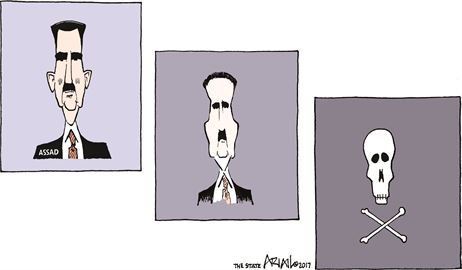Diplomacy with Iran is over — and so is the era of Obama’s straw men.
Matthew Continetti at National Review "President Trump did more than retaliate for Bashar al-Assad’s illegal and inhumane use of nerve agents against civilians when he ordered the launch of 59 Tomahawk missiles to destroy al-Shayrat airbase in Syria. He also detonated a few shibboleths of his predecessor’s foreign policy.
First is the idea that President Obama’s 2013 deal to remove Assad’s weapons of mass destruction was a success. Susan Rice and John Kerry have lauded the agreement with Russia to supervise the extraction and destruction of Assad’s weapons stockpiles as recently as the last year. But Assad’s brazen attack on civilians in Idlib Province exposed their celebrations as premature. Trump’s swift, decisive, and limited response ended more than a half decade of vacillation toward’s Assad’s behavior. Obama diplomacy failed, but hard power may yet deter Assad from using weapons banned for almost a century.
"The second casualty of the U.S. strike was the absurd Obama line that the only alternatives available to a president are inaction on one hand and a massive ground invasion and occupation on the other. Obama and the architects of his echo chamber would slam any advocate of military measures as a bloodthirsty warmonger ready to repeat the worst mistakes of the U.S. experience in Iraq and Afghanistan. But the reality has always been that there are a range of intermediary steps America can take to pursue her objectives and enforce the standards of Western civilization. " . . .

